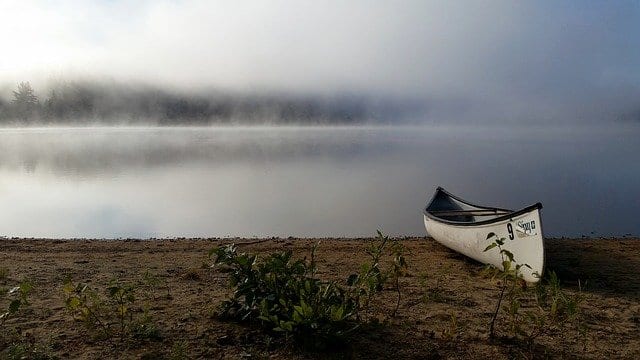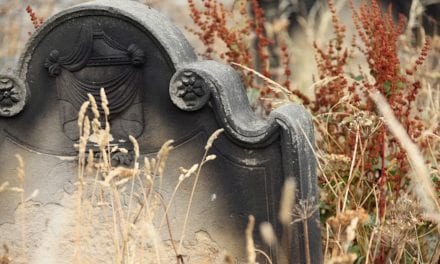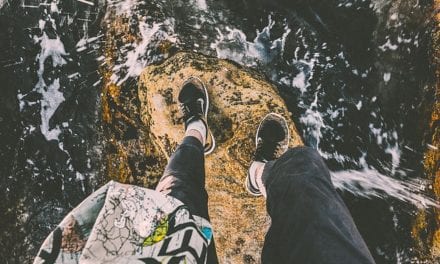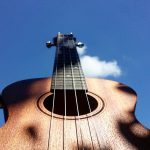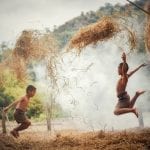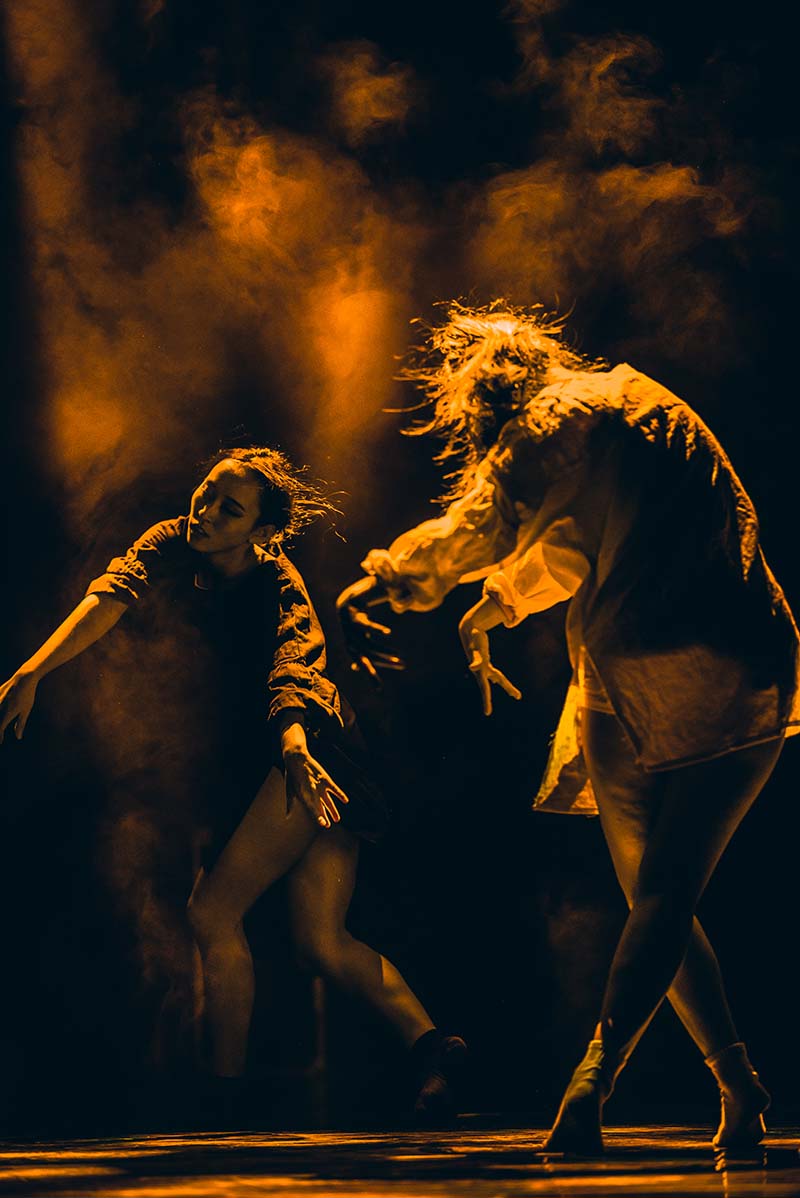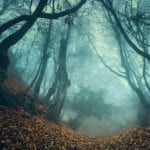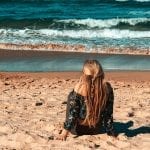The sun’s pale reflection on the stillness of the mist-laden water was cut, unfolded, folded, and re-laid by the canoe’s passing. The air was crisp and light, not unlike an October morning. But it was an August morning, which would soon turn to a warm and heavy August afternoon as the sun rose higher in the indigo sky. Peter Brant, shirtless in his trademark cargo shorts, thought himself as well prepared as possible for the looming heat and humidity that had been typical of the past few weeks. His bare feet rested on the cool bottom of the boat. His upper body, bathed in sunlight from behind, moved in an irregular side-to-side motion as he paddled. Sweat had already begun to form under his lean arms, and his scalp was starting to itch. It would soon be time to jump in to cool off, he thought, feeling the rivulets of moisture roll tantalizingly down his side.
Brant paddled with casual, almost listless strokes as he set out for a day of relaxation along the creek, armed only with two ham and cheese sandwiches hastily grabbed from the deli cooler, a packet of peanut butter crackers, a bunch of grapes, four peaches, two bottles of spring water, and a well-read copy of Vonnegut’s Slaughterhouse Five he had found under the bed while looking for his sneakers. Unlike Billy Pilgrim, Brant would have welcomed the notion of becoming unstuck in time. It was certainly a more appealing concept than work, or lounging around his too empty apartment now that Melissa was gone. To slip from the complications of the present into any other time seemed almost possible while gliding across the tranquil water. Though war-torn Dresden wouldn’t have been his first choice.
Beyond incessant birdsong, the occasional hollow-sounding scrape of his wooden paddle against the side of the aluminum boat, and the peripheral ripple of water, it was blessedly silent. Almost impossibly silent. And solitary. Thankfully, solitary. He was alone, and had been since spotting a jogger and her dog shortly after putting into the water. He was wholly alone—no phone, no fax, no e-mail to disrupt the isolation. The cell phone was stowed in the trunk of his car, and Brant felt the better for the silence, once he managed to get over the guilt of being unreachable. Unreachable. He liked the sound of that, almost as much as inaccessible. Everyone should be inaccessible on such a lovely morning. The world should be full of inaccessible people, doing unimportant things, becoming unstuck in time, unreachable to anyone but themselves.
His progress along the narrow waterway was steady. Brant hardly had to put effort into paddling—he need only allow the subtle undercurrent to pull him along at its own pace. The smooth paddle felt good in his hands, though his palms were beginning to turn red and blister from the tight grip.
There was nowhere in particular to be; the intent was to slip away, to drift into a void where nothingness was potency and obliqueness supreme. A place and time where clients, depositions, and paperwork ceased to exist, never existed, nor could ever exist, not even in the dreams of madmen. He wanted to be impenetrable to the memory of Melissa.
The scenery was invigorating in its beauty, soothing in its simplicity. Brant let his vitality-starved pores soak in all that was possible, and wouldn’t be satisfied until he was completely saturated. He pulled in the paddle, laid it across his knees and let himself absorb the moment—feeling inner grayness slip away, replaced by resplendence and vibrancy—he could be anything he wanted, or nothing at all.
The eastern hills were jagged. Moss-stained granite jutted out at all angles, littered with rhododendron and mountain laurel, extending from the water’s edge to the crest of the blazing sun. The setting was so rugged it was almost impossible to believe that streets and cars and houses were just beyond the ridge. To the west lay a narrow, relatively-flat strip that had once been a tow path, now an overgrown jogging course for those brave enough to attempt it, before rising to hills of great heights. Green was evident in shades from honeysuckle chartreuse to hemlock emerald, and the browns and blacks of soil, rock, and bark were definitive in their starkness. The air was a mixture of sweet vegetation and the bitterness of evaporating water that formed a potent tranquilizer. The rich flora dipped, enclosed, and encroached on both sides, so parts of the course were like a tunnel, surrounding in a pleasant way that was far less restricting than the walls of his office, or confines of car, where he spent far too much time. The water was an almost-clear, enabling him to see the rocky bed bottom a few feet below. Mud stirred from a mild summer storm three days earlier had all but settled, almost crystal clear, such that fleeting carp, trout, and tadpoles were visible among the occasional glint of an entombed beer can.
Could the world of a fish be nearly as complicated as that of man? Brant considered with an inner smile. After all, both seemed to be constantly swimming upstream, avoiding predators, trying to get somewhere other than where they were. Each was driven by the same urge of self-proliferation. When it came down to it, was the self-preservation instinct all that different?
The sluggish water gained speed, a frothing against a cluster of rocks was the only warning. Brant cast aside his contemplation of fish to paddle clear of the rapids, rounding a sharp curve saturated with sunshine. The canoe whipped and bounced around the bend with a force that surprised and almost unseated him, but slowed as fast as it had rocketed forth. Panting with excitement and thankfulness, Brant lowered his throbbing head. Though his chest and arms pulsed with adrenaline warmth, his back and shoulders were drenched with soothingly cool water, the contrast almost numbing. He pulled himself straight, hearing the protest of shifting bones, and reached for the spring water.
As he let the cool, lime-tainted water splash against the back of his throat, something caught Brant’s eye. Amid the solitary, almost primeval surroundings, an incongruous structure suddenly loomed in the widened course ahead. It was dark and insignificant amid the encompassing foliage, but must have, at some time, meant something to someone, because a sandstone block at the far bank announced its presence with a modest certainty. It was something that didn’t quite belong in the green tangle, but there it was.
Brant paddled closer to make out the lettering. He wished he had worn his glasses and cursed himself for having left them in the car. He splashed water on the stone, and with some effort, squinted the characters into focus. Guild House. The stone was weatherworn and moss-stained, yet the words were decipherable. “Guild House,” he sighed aloud. It couldn’t be, he thought with mild surprise. The Guild House of his youth? But yes, it could be, it must. Somehow. How many could there have been? The waterway was wide and shallow. There was a pale beach on the opposite shore. The surrounding rock faces were tall and resolute, familiar sentries of the hollow. This could indeed be the place. “Have I really come that far?” From what he recalled, the spot was miles from his starting point, but it was possible the creek could have carried him the distance. The water was more diligent than he had realized.
Sounds and images filled his head: Dragons prowling outside castles. Cops chasing fleeting bank robbers. Plains cowboys battling fierce Indians. The words, Guild House, stirred all those things, and more. The memories came in waves: happy days spent within its walls, many lives lived. Explorers, adventurers, knights, sailors, and detectives had all been in residence at one time or another. Brant paddled to the water’s edge for closer inspection of the building, and felt the sudden chill of the shade. He pulled on a shirt while contemplating the vaguely familiar place.
Though half of the two-story house lay in shade, sunlight glistened off the windows on the exposed side, as if the illumination were not permitted to penetrate the splintered panes. The reflection prevented his seeing inside, retaining whatever secrets lay within. The sagging wood siding ranged from a neglected exposed-brown to moss-covered green, with occasional patches of persistent white paint lingering in corners and under clapboards. The chimney, many of its bricks loose and covered with a thick ivy matting, arched painfully from the prevailing winds of the west. The entire structure looked as if a good sneeze could level it completely. Could it still be inhabited? There was an air permanence about the place that might just make it possible. Brant tied the canoe to a scraggly maple tree, but could not yet bring himself to step onto the shore. He leaned back in the boat, watched, and pondered.
The world grew still as he sat, even the air seemed to stay in place. Brant’s mind reeled to former days as he bit thoughtfully into a peach. There was something impossible about this spot, he breathed softly, something wrong with time, a rippling distortion that danced on his skin.
The Guild House! There was a special reason he knew this place. But why? No, it came, not why but who. Who was it? Meyers. Yes, Alan Meyers. Alan Meyers lived there, had lived there, might have lived there. The distortion was potent; he couldn’t be sure of anything. But that was a long, long time ago, if at all. What was it, twenty, twenty-five years?
The two had met when Peter changed junior high schools, just after his parent’s divorce. Through the pain and bitterness, Alan Meyers was a beacon, a fixture that didn’t want anything from him, except friendship. Alan had been the first at the new school to befriend Peter and make him feel welcome. Through phone calls, Saturday afternoons, and after-school walks, the two became close friends. It was a warm June morning, two days after school had let out for the summer, Brant’s mind replayed, when Meyers brought him to the Guild House for the first time.
“Your grandfather really built this place?” Peter questioned, in awe, as the two sat on the front porch, sipping sodas, watching the creek roll by.
“Yep.” Alan boasted, leaning back in his chair. He said he was sucked into some kind of vortex as a child, dragged under the water in some place called Inwood Indiana, and he came up here. He figured that meant he should buy this land and keep it hospitable for anyone else who shows up.
“Really?”
“Took him and some friends five years to build, he said. He died the winter after it was finished.”
“And now it’s yours?” Peter couldn’t believe his friend’s fortune. Since the divorce, he didn’t think anything really belonged to anyone.
“Will be. It’s my dad’s now, but I’ll have it when I grow up.”
“You gonna live here?”
“Maybe.” Alan shrugged. The possibilities were almost tangible.
“I bet it’s spooky at night.”
“You bet. You wouldn’t catch me down here in the dark.”
“Your grandfather didn’t…” Peter fumbled, “die here, did he?”
“No, he was in a car accident in town.”
“Good. I mean, not that he died…but, you know.”
“Yeah, I know.” There was an understanding that needed no words.
“What’s the name mean?” Peter asked, trying to put the awkward moment away.
“Guild House? Dad said it was built by some men who all shared a secret. That’s all he said, except that they were in a club called a Guild.”
“So, this was their club house?”
“Yep.”
“Now it can be our club house.”
And so it was. Military headquarters, frontier trading post, rocket ship cockpit. The Guild House was all those things in the months and years that followed, a haven for adventure and sterling friendship. It was The Everything Place, as they called it, their special retreat from the world. Peter and Alan grew as boys and friends; they went to the same high school, played on the same sports teams, joined the same clubs, and had many of the same friends, but the Guild House was always their secret, never shared, never compromised. It remained their bond.
~~000~~
Brant wanted to climb onto the bank, wade through the scrub, and throw open the front door, if the sagging porch roof would allow. But what could he hope to find on the other side? The past? Not necessarily his past, but a past? He began to remember the shoreline as it used to be, his pushing aside the brush as he made for the house. The window loomed. There was a voice beyond, muffled. His friend? Alan? As he crept forward, he realized there were not one, but two voices, counterbalanced. One sounded, then the other, then the two in unison. The more he listened, the more he realized that it wasn’t the sound of conversation, perhaps a recital of some kind, but definitely not a conversation. The voices grew louder as he snaked under the front room window.
Cupping hands to eyes, he peered through the gap in the curtains. The voices suddenly had form and shape; they became two people, writhing. Peter heard the pounding of his heart as Alan Meyers came into focus. There was someone else inside with him! It was Alan, but he did not look the same naked as he did clothed. There was a vulnerability about his white skin that was alarming. Peter stared in disbelief as he watched his friend laying with another naked, pale form. He did not have to see the face to know it was Becky Tovey who had been brought to the sanctuary; he could tell by her slightness and long auburn hair. But Becky Tovey was his girl, Alan was his best friend. This could not be happening. This was The Everything Place!
Peter knew dragons would no longer come to this place. Nor robbers or wild Indians. This was a child’s realm no more, but a place of pain. Everything he had hoped and believed had been false, and something began to consume him. The pain took his breath away. He turned, clenching his shaking hands, and ran in any direction. It did not matter where; there was no escape from the blazing image of the two young lovers. He tore through the underbrush, felt his skin scratched and cut by branches and brambles, heard the voices of the woodland laughing. He ran on and on, shedding blood and tears, wanting to get as far away as possible.
A branch brushed his face, bringing Brant back into the present. The vision of Alan and Becky departed, he tossed away the peach pit and dipped his sticky hand in the water, feeling the chill creep up his arm. He was alone, and for the moment, empty. But if he could escape this place one more time, evade the grip on his chest, a wholeness lay at the end of the course. His phone and fax and e-mail awaited. His clients would be expecting him at the office.
Brant looked the way he had come to see gray skies looming overhead and chalky water pouring angrily off the rapids. There would be no going back that way, nor returning to the way he was before finding this place. Forward seemed the best course of action. He decided he could ride the creek another few miles, until it spilled out onto the river at the boat club, then call for a ride.
He reached to untie the knot, let the rope slip from the tree and fall into the water with a splash. Many knots had been untied here; this seemed to be a place for it. Now untethered, the current instantly gripped the canoe, pulling it away from The Everything Place. The boat scraped and dragged against a pendulous willow before floating free. Peter Brant took the paddle in hand, and moving into the sunshine, never looked back at the gray.

